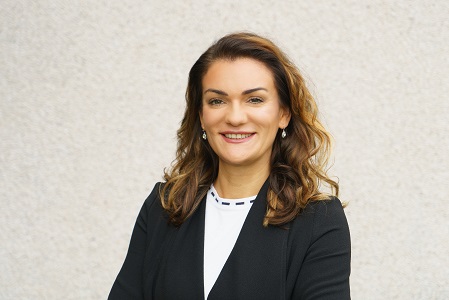
For International Women's Day 2022, Christina Warner highlights her experiences as a visually impaired, LGBTQ+, disability inclusion activist and legal practitioner.
I think one of the biggest challenges for successful women at the Bar is the dreaded imposter syndrome. The unfounded sense of paranoia and the little voice which continuously questions your abilities and skills. But I’m sure this can be said for women in most conservative, high-pressure careers which challenge our ability to maintain a healthy work/life balance. Keeping our mental and physical health on track is often easier said than done.
But feeling unsure is nothing unusual and may be a great learning opportunity. Speaking with other women at the Bar, the nagging feeling of self-doubt and the second-guessing is much more common than I’d once thought. Much needs to be done by way of open dialogue as to how we manage and combat our unjustified feelings of inferiority and the anxieties that come with it.
There’s something so unsettling about one woman trying to hinder the progress of another woman. It’s essential that women help each other – where one of us progresses, we all do.
According to the BSB’s latest report on diversity at the Bar, of the 56.9% of barristers who provided information on their disability status, only 6.3% disclosed a disability. This is substantially lower than the percentage of disabled people in the employed working age UK population estimated at 11.3%.
When excluding those that had not provided information, 6.3% of the Bar; 6.6% of non-QC barristers; 5.3% of pupils; and 3.4% of QCs had declared a disability as of December 2020. The figures also suggest that the percentage of those with a declared disability may decrease as level of seniority increases.
These figures are particularly poignant to me as I was diagnosed in 2021 with Stargardts Disease (juvenile macular degeneration) which is a rare genetic condition which causes progressive sight loss and, in some cases, blindness.
After profound feelings of isolation and grief, I was pleased to find other barristers who manage the challenges of their disability alongside a very successful practice. Similarly, needing to divulge the obstacles I face as a result of hearings going back to being in person, I have found that the disabled community has plenty of allies, with disability affecting them by proxy. Sharing the need for my assistant to be present with me during hearings has often prompted colleagues or court staff to share their very personal stories of encountering disability: a parent struggling with an autistic child, an adult child caring for a parent with dementia, stories of struggles with chronic fatigue, PTSD and post-natal depression. These sensitive conversations, prompted by the small plastic card I wear on a lanyard around my neck which lets the people around me know that I’m visually impaired.
I’m honoured to hear people’s stories and appreciate their honesty when speaking of their struggles. Inevitably, I believe that those of us with disabilities challenge the status quo and trigger somewhat of an existential crisis in able-bodied people. I once was, able-bodied, so understand this.
I’m incredibly lucky to form part of numerous associations which champion change and raise the voices of those from marginalised communities. I am a trustee for AllBar and Bridging [Dis]Ability to the Bar which both support barristers with disabilities and act as a forum for discussing topics affecting the community. I am also a committee member for LAGLA LGBTQ+ Lawyers’ Association and voluntarily work alongside GALOP, one of the UK’s only remaining LGBT domestic abuse and hate crime charities, offering them advice, training and support.
I’ve also worked alongside various animal welfare associations and charities discussing issues of animal protection in the context of family law and domestic abuse. Animal protection is an area of law which has seen a phenomenal growth in recent years and it’s refreshing to see that issues of animal protection are being taken much more seriously with legislative developments and campaigns raising awareness becoming more mainstream.
I was appointed social mobility advocate by the Bar Council in 2021 and proudly represent the disabled community when sharing opinions and concerns about access to justice.
Most recently, I was appointed to the Bar Council’s Disability Panel which is a great resource for those who have a disability thinking of a career at the Bar as well as raising concerns by practitioners with disabilities or who wish to know more about what affects the community.
Christina Warner is a barrister at Goldsmith Chambers.
Access more information and blogs about Women in Law.